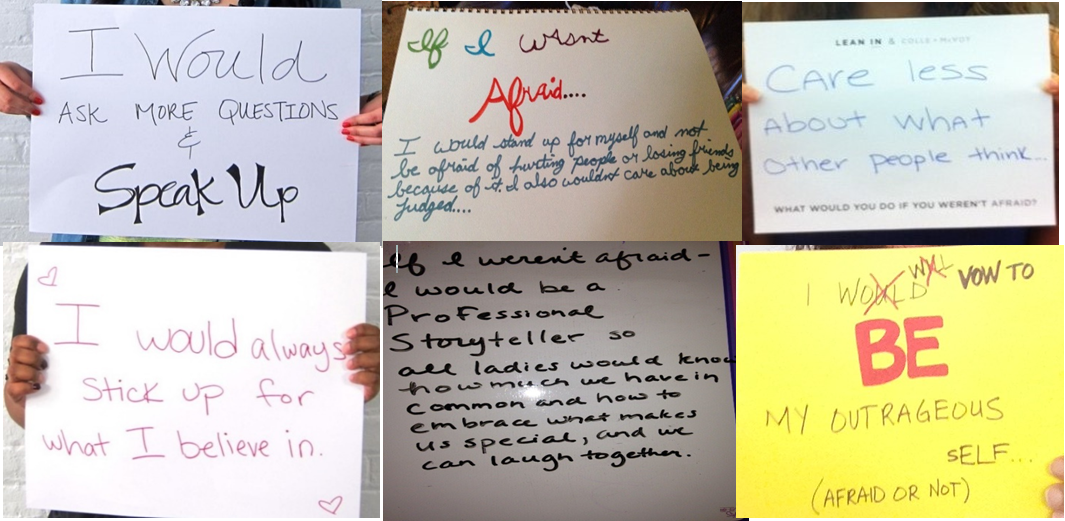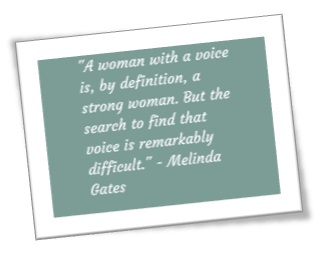A Coaching Model Created by Amanda Jane Franklin
(Communication and Leadership Coach, ITALY)
V Value
O Overcome
I Identify
C Communicate
E Empower
After her famous TEDTalk“Why there are so few women leaders”, Sheryl Sandberg, COO for Facebook, set up a blog entitled“What would you do if you weren’t afraid?” where women and girls were invited to send in photos of what they would do if they weren’t afraid. The result was a beautiful reflection of women’s hopes, dreams, and fears. I found it deeply moving as it struck me how much we often hold ourselves back from realizing our full potential just because we are afraid to speak up, afraid of being judged, not feeling good enough.
ICF defines coaching as
partnering with clients in a thought-provoking and creative process that inspires them to maximize their personal and professional potential.
However, many people, especially women, are unable to maximize this potential because of their inability to voice exactly what they are feeling/thinking/experiencing. Many times we find ourselves saying not what we would really like to express but what we believe the others would like to hear, biting our tongue and holding back that which we fear may be misunderstood or taken as confrontational. Furthermore, we may decide not to say anything at all, and to stay in silence even when what we would have to offer could be of great value to all, held back by the fear of being seen as stupid or of being ridiculed.
If we wish to live true to ourselves and our beliefs, it is fundamental for us to voice what comes up for us, expressing our opinions, our feelings and thoughts, being confident about the message and not worrying, or worrying less, about what the others around us think.
My coaching model, V.O.I.C.E.up, has been designed for professional women who feel they have many things to say but are being held back. It aims to empower them to own their beliefs, thoughts, and opinions and literally ‘voice up’ and proudly share these with others.
Speaking your truth is the most powerful tool we all have – Oprah Winfrey
Value
As mentioned in my PowerTool ‘Flawed vs Flaw-less’, so many of us do not appreciate who we actually are, we do not accept ourselves fully and certainly do not acknowledge, let alone celebrate, our achievements or strengths.
‘Value who you are’ means supporting the client to look inside themselves, recognizing that along with their ‘faults’ they also have so many positive traits, lots of competencies, and a multitude of other things to offer up. In addition, it is fundamental to support the client in re-evaluating what they perceive to be their faults.
Raising self-awareness is the key element in this part of the process.
Possible questions are:
Overcome
Once the client has begun to gain an awareness of their worth and begun to value who they are, now is the time to support them in shifting their perspectives to allow them to overcome the barriers that are holding them back from seeing and being their true self.
Everything you’ve ever wanted is on the other side of fear. – George Addair
This is the moment where the client should feel safe enough to explore what it is exactly that is making them feel so afraid of speaking out, what has been holding them back. In addition, they will come up with ideas on how to face these challenges in a way that is different from how they have been dealing with them up until now. Here we may touch upon underlying beliefs, dis-empowering perspectives, or the consequences of negative experiences.
Possible questions are:
Identify
With now having the awareness of who they are and having come to understand what has been getting in their way, in this part of the process we support the client in identifying what they would like to speak out about, what they would like to achieve, their purpose and values in life.
Here we are speaking about their intent, their conscious realization of what their intent is, and what behaviors they can and will need to adopt in order to achieve this.
Possible questions are:
Communicate
As Caroline Goyder says in her book ‘Find your Voice’,
Breath is life. Voice is breath. Your voice is you. When you can say ‘This is my voice’, you find that the world sits up and listens because you communicate from a place that is strong and clear. You speak up with confidence and you stand out.
Once our client knows their intent, we need to support them in gaining the confidence to communicate who they are, their thoughts, their opinions, and their values. They need to embrace their voice, embrace their vulnerability, and realize that, by doing so, they will be communicating who they truly are – their authentic selves. Only they are able to express their own voice. Moreover, for generations women have had to fight to gain the right to speak up for themselves and, by not using our voices, we are dismissing the power and freedom that they have so selflessly passed on to us.
In this stage, we are building the actions needed for the client to finally voice up, actions that are realistic and achievable and which will move the client forward towards ever greater confidence.
Possible questions are:
Empower yourself and others around you
The final phase is to deepen that feeling of empowerment, allowing for lasting transformation. It will bring in the need for true commitment in order to stay fully accountable for the actions decided upon and for the vision. Without this commitment and accountability, there would always be the risk of slipping back into old comfortable habits.
The client will empower themselves step by step until it becomes second nature but will also begin to empower others around them who they see are struggling to find and use their voice.
Possible questions are:
It took me quite a long time to develop a voice, and now that I have it, I am not going to be silent. – Madeleine Albright
 Photos courtesy of https://ifuwerentafraid.tumblr.com/
Photos courtesy of https://ifuwerentafraid.tumblr.com/
References:
https://ifuwerentafraid.tumblr.com/
Bachmeyer, Ellen: Why Women Should Reclaim Their Power: Let’s Speak Up!
Goyder, Caroline: Find Your Voice: The Secret to Talking with Confidence in Any Situation
King, Chrissy: What Does It Mean to “Find Your Voice”?
Sandberg, Sheryl: Why there are so few women leaders– TEDTalk
